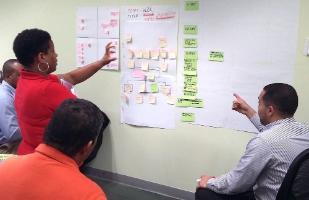"We delivered 2300 hours of training in 19 countries – what did we learn?"
In the Caribbean Region, delivering results is one of the greatest challenges facing policymakers. In 2017, the rate of successful project implementation in some Caribbean countries was just 20 per cent.

From 2017 to 2019, CIDT led the delivery of a large training and capacity development programme to strengthen capacity of Government officials in results-based tools and thinking around the project cycle.
The training received 97 per cent satisfaction levels from the 1,273 senior government officials that participated from across 19 Caribbean countries.
CIDT’s Ella Haruna and Daniela Baur look back on this successful programme and share reflections on some factors behind the success of the Caribbean Development Bank’s Project Cycle Management (PCM) Training Programme.
This was a large significant training investment for the Bank; what were the unique features of this programme?
Ella: The programme was intended to create a critical mass of skills in each country through a wide national training roll-out, and with priority to local, national and regional Caribbean experiences.
CIDT responded by pairing international and regional experts for each training cycle and the training audience felt they were getting the best of both worlds.
The training audience was mainly composed of mid-career professionals, many with decades of experience in civil service. A key challenge was how to make the training relevant across a range of levels and types of experience. How did you approach this?
Ella: CIDT’s facilitated experiential training approach proved very popular here, as it allowed participants to focus on live projects from their real environment and simulate project teams.
This made the learning very present and relevant; especially compared to traditional ‘chalk and talk’ training approaches in the region. However each country context was unique and every national training audience was different; one early challenge was how the team could meet the needs across these different contexts without reinventing the wheel each time.
Daniela: We developed a core set of module materials with the potential to be ‘dialled up’ or ‘dialled down’ according to capacity needs in different settings and with different groups and again the role of regional associates in helping CIDT staff nuance the training design to local Caribbean contexts was critical.
Our modular curricula included learning pathways whereby certain online and face-to-face modules were pre-requisites for other more specialised or advanced modules.
Did everything go to plan?
Ella: In reality it didn’t really go the way we planned! We often had participants that needed a grounding in basic tools and principles signed up to participate in more advanced modules.
However inviting more experienced participants to orient these newer colleagues was one technique we developed in response.
Did working with participants from different countries present any challenges?
Ella: We initially struggled with the adaptation of materials and delivery to reflect a very regionally specific gender picture in the Caribbean, where attitudes and dynamics around gender are entrenched. Many Government officials perceived ‘gender’ as a donor-driven agenda for women’s empowerment. The trainers were able to use regional knowledge to defuse this tension, encouraging participants to apply a gender lens around the project cycle.
Daniela: The programme faced its fair share of challenges! We delivered training during unrest and national demonstrations in Haiti, and in Dominica and the British Virgin Islands in the aftermath of hurricanes Irma and Maria.
Ella: Even the need to deliver curriculum and training in French and Dutch as well as English posed something of a challenge!
What were some of the helping factors through the project?
Daniela: We found that senior management championship helped learning to be taken more seriously and emphasised participants’ potential to facilitate change.
Then there were the elements that went beyond a one-off classroom interaction to embed the learning, for example the Virtual Learning Symposium (VLS) eight weeks after training offered a refresher on course material and a space to reflect on progress with personal action plans.
Ella: There was a clear programme commitment to sustainability via the train the trainer component – however TTT requires careful targeting to be meaningful and further time and resources were needed to structurally embed it. However a regional workshop with 18 national training coordinators to explore the scope of future PCM training and develop national action plans was a great step in the right direction.
From 2013–19 the CIDT team undertook the successful:
- Design and delivery of a large and complex Training Needs Assessment study across 18 countries of the Caribbean.
- Design of a participatory Monitoring and Evaluation framework for the whole Capacity
Development programme.
- Design and delivery of a Project Cycle Management curriculum of eight tailor-made modules to and a follow-up webinar series.
- 255 trainers trained and facilitation and logistical support to regional programme conferences.
Read the full impact story on the CIDT website.
For more information please contact the Corporate Communications Team.


/prod01/wlvacuk/media/departments/digital-content-and-communications/images-2024/Diane-Spencer-(Teaser-image).jpg)
/prod01/wlvacuk/media/departments/digital-content-and-communications/images-18-19/220325-Engineers_teach_thumbail.jpg)
/prod01/wlvacuk/media/departments/digital-content-and-communications/images-2024/240509-Menopause-Research-Resized.jpg)
/prod01/wlvacuk/media/departments/digital-content-and-communications/images/Maria-Serria-(teaser-image).jpg)
/prod01/wlvacuk/media/departments/digital-content-and-communications/images-2024/241014-Cyber4ME-Project-Resized.jpg)
/prod01/wlvacuk/media/departments/digital-content-and-communications/images-2024/240315-Research-Resized.jpg)
/prod01/wlvacuk/media/departments/digital-content-and-communications/images-2024/BDA-group-photo.jpg)